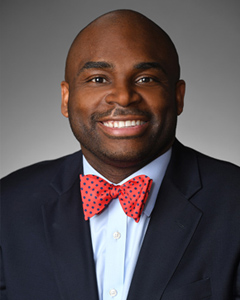College of Medicine Faculty Receive Grant to Create Online Antiracism Module
June 17, 2021
Drexel University College of Medicine faculty will receive $300,000 over the next three years to spearhead creation of an online learning module on antiracism. The project is funded by the Josiah Macy Jr. Foundation, which aims to improve public health through advanced education and training for health care professionals.

Leon McCrea II, MD, MPH

Dennis Novack, MD
Principal investigators from the College of Medicine and the University of Kentucky will collaborate to create a free, online module on antiracism, to be used as part of health care education curricula. Project leaders will work with partners including Drexel University’s College of Nursing and Health Professions and the College of Medicine’s Technology in Medical Education (TIME) group to bring the module to health professions students and faculty at the College of Medicine, the University of Kentucky and several other higher education partners.
The project’s principal investigators at the College of Medicine are Leon McCrea II, MD, MPH, senior associate dean for diversity, equity and inclusion, and Dennis Novack, MD, associate dean of medical education. Each bring to the table experience in clinic- and classroom-based medical education. McCrea is an associate professor in the Department of Family, Community & Preventive Medicine and the director of the Family Medicine Residency program at Drexel University College of Medicine, while Novack is a professor of medicine.
The pair will collaborate with Camille Burnett, PhD, MPA, an endowed professor at the University of Kentucky Center for Research on Violence Against Women, an associate professor in the University of Kentucky College of Nursing, and a strategic advisor for community engagement and academic partnerships in the Office of the Provost. Burnett holds several research affiliations and is a PI in multiple studies focusing on fostering health equity.
“Antiracism health care education is needed now more than ever,” the investigators said in the grant proposal. “Health care providers have a moral and professional responsibility to redress health inequities.”
The project aims to not only train future health professionals who will provide compassionate care and approach all patients with respect, empathy and cultural humility, but to also create learning environments where all feel welcome and empowered.
“Students who are underrepresented in medicine are at greater risk of poor personal well-being, increased stress, depression and anxiety,” the investigators said. “Burnout is common among resident physicians, which can increase the expression of prejudices associated with racial disparities in health care.”
According to McCrea and Novack, the module will enable health professions trainees to:
- Discuss historic and ongoing structural racism
- Identify their biases and how these biases influence their interactions with others
- Respond appropriately to racist behaviors from patients and colleagues
At the College of Medicine, the module will be used for incoming medical students’ orientation programming, in ongoing courses, and for faculty and professional staff antiracism training at the College of Medicine and its clinical partners. The module will also be used to help enhance antiracism education for health professions students and in interprofessional programs in the College of Nursing and Health Professions.
Rita Guevara, MD, assistant professor of pediatrics and assistant dean of diversity, equity and inclusion, and Kristen Ryczak, MD, assistant professor in the Department of Family, Community & Preventive Medicine and director of the Women's Health Education Program, will create faculty development materials and programming for faculty, staff and affiliate site trainings. Kymberlee Montgomery, DNP, senior associate dean for nursing and student affairs at CNHP, will collaborate with McCrea and Novack on interprofessional and CNHP-based use of the module.
The module will be available via College of Medicine-created educational resources DocCom, a comprehensive online resource on health care communication produced by Drexel University College of Medicine and the American Academy on Communication in Healthcare, and
Center for Professionalism and Communication in Health Care, an online resource focused on professionalism in health care education.
McCrea and Novack said the successes of those two resources, along with the production of over 60 health professions-based online learning modules by the College of Medicine, will help the antiracism module to succeed at reaching and engaging its audience.
Launched in 2007 thanks to a grant from the Arthur Vining Davis Foundation, DocCom was the first of several online health care skills-training programs Novack helped create; in 2017, PFO was made possible by grants from the Arthur Vining Davis Foundation and the Josiah Macy Jr. Foundation. Today, DocCom has almost 42,000 subscribers across 80 institutions, while PFO’s free content serves 523 health care educators, according to McCrea and Novack.
The antiracism module’s content will ensure and assess learning by following a similar format to other PFO offerings, with a mixture of video presentations, small- and large-group discussion, assessments and multiple-choice questions. The module will be accompanied by guidelines for student-, faculty- and staff-focused antiracism workshops; guidelines will be based on best practices in antiracism education, including competencies determined by the Association of American Medical Colleges.
“At Drexel University College of Medicine, we are uniquely poised to develop high-quality, compelling, interactive and educationally effective online learning modules,” the grant proposal notes. “We are confident that we can make a positive impact nationally on antiracism education in health care.”
Back to Top